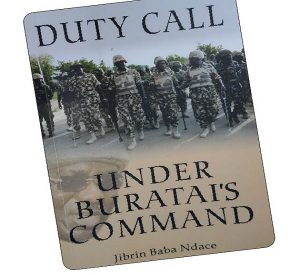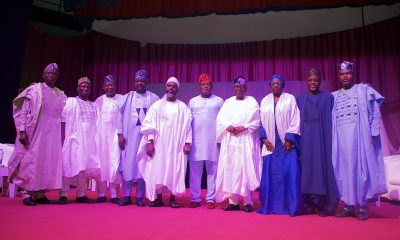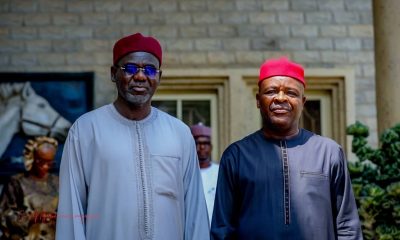celebrity radar - gossips
Duty Call Under Buratai Command By Jibrin Baba Ndace
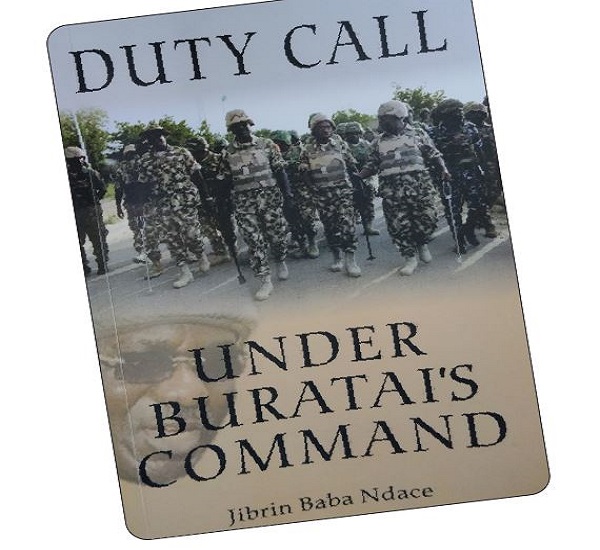
Duty Call Under Buratai Command By Jibrin Baba Ndace
The title is apt. In this book, Duty Call Under Buratai Command, the author, Jibrin Baba Ndace, is concise. He goes beyond the era of Buratai as the Chief of Army Staff to delve into the early years of Nigeria’s statehood to situate a nation that has come a long way. The book is like a treatise, well researched, documented and properly presented on the political and other issues that have helped to form a nation. But above all, Ndace is critical on those salient but sensitive areas and deeds that helped Gen. T.Y. Buratai to come out tops in his onerous tasks and responsibilities to uproot terrorism from the land.
But in order to fully comprehend the sentiments expressed and embedded in the book, it is better to still pick a copy. It is a book that is deeper than the subject matter. It is history reiterated to suit the mood of the nation. It is history that is well replicated, re-enacted to teach, to remind, to remold the minds of the people. Apart from a lengthy acknowledgement that has helped to reveal and know the people that assisted to appreciate the efforts that made this publication possible, the author is equally unwavering in his research efforts. He is painstaking. He is thorough.
His call to join in the reportage of the fight against terrorism in the different fronts where the battles were fought was prompt, immediate, yet Jibrin, as a journalist, quickly embraced this call pronto. This is the opening of the story. This provides the enabling zeal and foundation for this book to be muted and executed. “That was it. Preparations for Sallah became preparations for departure to Maiduguri at the briefest notice. Thus began my story which is something close to a travelogue, in the shadows of Lt. General Tukur Yusuf Buratai, Nigeria’s Chief of Army Staff”. Page XXVI. However, this book is more than a travelogue. It is deliberate, more profound and seriously treated to open people’s eyes to the nitty-gritty of the nation state. Indeed, this is a compendium, a collector’s item.
This is why the book is divided into sections, within fifteen broad chapters. Each chapter treats much broader issues that pertain to Nigeria, to the roles of individuals, army, civilians, all, to enable Nigeria grow or otherwise. Chapter one entitled Sad Tribute of a nation at war with itself, suddenly becomes a leeway into the core basis of the entire book. “A nation divided against itself cannot prosper”, page 1. This anathema or truism summarizes the nation called Nigeria. But the author is quick to stress the role of Britain, the colonial overlords, the responsibilities or lack of it played by Nigeria’s early leaders that resulted to the Nigeria of today. As you make your bed, so you shall lie on it, seems to be the author’s mantra concerning the state of the nation Nigeria, indeed the Nigeria of today.
On page 2, he makes it explicitly clear: “The country is blessed not just with natural resources, but the exploits of her people all over the world across all sectors, speak volumes of her massive human resource endowment”. With this, he goes into some remarkable offers and statements by previous leaders to lead Nigeria aright. What the author is saying invariably is that it is the errors of leaders past and present, that bred and keep breeding the terror of today. Yes, because “Despite hope by founding fathers since independence Nigeria’s journey to nationhood has been turbulent and tumultuous due largely to her internal contradictions and inability of the political players and other influential stakeholders to safely and adequately address their differences for a more united and prosperous country”. And so on and so forth. Page 4.
In chapter two, captured: New enemy, new challenge, the author is clear as to how the issue and the roles of army and indeed the military generally have pointed the way forward for Nigeria. A nation breeds the kind of military that tackles its numerous internal problems. Even then conflicts have been part and parcel of humanity over the years, but how has Nigeria tackled its own problems over time? Books have been written, ideas canvassed and espoused, but have these helped to suppress or prevent wars and crises? Ditto: World Wars I and II and the Nigerian civil war and others across the globe.
On page 31, it is made clearer, “What was however unknown to or not noticed by many Nigerians was that while the arm forces of Nigeria and other security agencies were battling militancy in the Niger Delta, communal clashes, political thugs, armed bandits and other forms of criminal tendencies in the country, a deadly group was establishing its roots in North eastern Nigeria”. Thus, Boko Haram was born. Jibrin thus hits the nail on the head as he sets minds racing into the past.
In chapter three, we encounter a recurrent theme in the Boko Haram’s adventures in Nigeria. Entitled: The Chibok nightmare, the author opens it with a mind bogging quote. “Terrorists are masters of mind control”. This was the strategy they employed from the onset to upstage the scene and put Nigerians in a state of anomie, fear and disarray. It was then time for the military to act promptly and decisively. The abduction of the Chibok girls, the serious siege on Yobe and Bornu States set the nation and the entire military on edge. In the face of reckless and ceaseless bombings and killings in many parts of Nigeria by Boko Haram, the issue of the Chibok girls became a time to rise to the occasion. On page 39, “Clearly, 2014 was the year of Boko Haram… It also intensified its suicide attacks on major towns and villages in the country, including the federal capital Abuja… The Chibok abduction occurred the same day with another deadly attack on Nigeria’s capital, Abuja”. Thus, began the tortuous journey of these teenage school girls into the belly of Boko Haram.
Shouts of chei there’s God and so on, have since rented the air, yet, the girls are still in the dragnet of Boko Haram. For one thing, this book is provocative, bent on making history come alive, become renewed and topical in the annals of Nigeria.
In chapter four, we have the theme- The return of a ‘Seventh time loser’. With the coming of President Muhammadu Buhari, the tide suddenly changed for good. As soon as he appointed Lt. Gen. T.Y. Buratai, this brutish and no nonsense army general as a Nigeria’s Chief of Army Staff, he took the war straight to the home of Boko Haram. Jibrin, a close participant in this story is clear when he says that the emergence of Buhari after losing several times at the polls was a blessing in disguise. His coming into office thus became an albatross for terrorists in Nigeria. After tracing the history of Nigeria’s military since the colonial days, he gives unreserved credit to Buhari for his tenacity of purpose and prompt wisdom in tackling terrorism to its logical end.
On page 63, the book says “Like the armed forces, President Muhammadu Buhari’s trajectory is intrinsically linked to the history of Nigeria…” So when he became Commander-in-Chief of the armed forces of Nigeria in 2015, it was critical he rooted hoodlums out of the land. And this, in other words, commences the next stage of this book.
In chapter five, and with the Eagle Square Declaration, President Buhari noted: “Boko Haram is a typical example of small fires causing large fires”. He made the military trigger ready with this critical observation. As he drove into the Eagle Square for his inauguration, keen on his mind was how to free Nigeria from the foyers of insecurity. Also he quickly responded that Boko Haram was not the only security issue bedeviling our country. On page 80, he was deeply troubled when he says: “We are going to erect and maintain efficient, disciplined people-friendly and well-compensated security forces within an over-all security architecture”. And so he set the ball rolling with immediate effect. As an
embedded reporter, Jibrin knows how to critically background each chapter in order to send the necessary message across to the reader. This is one of the reasons this book is a must read for all well-meaning peoples of the world, particularly Nigerians.
In chapter six, Buhari is now in the saddle of leadership. Buhari in his usual characteristic way did not immediately change service chiefs. But when he eventually did, it was not just phenomenal, it was most effectual. Before this decision he had ordered the military command to move deeper into the North East for more effective counter-insurgency. This done, on July 13, 2015, he promptly appointed new service chiefs with Lt. Gen. T.Y. Buratai taking over as the Chief of Army Staff. Henceforth, Buratai took over with full force, swinging into action. Without wasting time he shows he is a man of destiny. On page 87, Jibrin refers to him as a man whom some of his course mates simply refer to as a cat with nine lives. Or a rejected stone that became the head cornerstone. A native of Biu, in Bornu State, his appointment as the son of the soil offered him plenty elbow room to swim within a familiar terrain to uproot and destroy the strongholds of Boko Haram.
No doubt, he comes from a community of warriors when his own father was also a soldier. Enamoured by his background, Buratai dares where angels fear to go.
His appointment, alongside others, is well enumerated in this chapter and this leaves no one in doubt that Jibrin is a talented chronicler, a historian in all sense of the word. Indeed he is a crack reporter.
Since the book is divided into parts as well, part two of it opens with A New Sheriff. And who is this Sheriff, so revered and feared and respected? This is chapter seven-Soja go! Soja com! Barracks no go empty! It is not just a slogan; it is the way of the military. It shows that no position is permanent. And so on 16th of July, 2015, Buratai officially took over the mantle of leadership with changes here and there in the army cadre. Ndace also reveals his own family history of soldering as a career. No wonder therefore he feels at home with his call to duty as embedded defence correspondent.
All in all, the author embellishes this part and chapter with appropriate glossary pictures of his exploits and those of his principal and all the people that are involved in this crusade. It is a glorious section.
And “Where do you think we are going”? This is the title of chapter eight of the book. Starting with an epoch quote by General Baron De Jomini that states that “If a general desires to be a successful actor in the great drama of war, his first duty is to study carefully the theatre of operations so that he may see clearly the relative advantage and disadvantage it presents for himself and his enemies”. Bearing this in mind, Buratai did not waste time to head towards the core inner areas of the North East to see first-hand where and how to tackle the insurgents. He needed to understand the geography better. While doing this he took along the military and civilian personae that mattered to him in this patriotic assignment. That was how the journey ended at night in Damaturu, the Yobe State capital. This was when the Boko Haram upsurge was intense, indeed at its hottest peak, tormenting the public to no end.
In chapter nine, attention is now focused on Damaturu. Entitled Damaturu: Walking on a battleground, we see a Buratai who is battle ready; who has chosen to surprise everyone with his unannounced entry into the town. It was a big blow to the enemies of the state. For this reason the soldiers who had been out there in the cold were happy to receive the Chief of Army Staff with an open arm. Page 139, “A soldier who told me he had been in the North East for four years expressed his delight. This will really encourage us. When your number one officer visits you and stays with you, eats with you, there is nothing more than that”, the soldier said.
It was in the midst of all these that all marched through landmines. In chapter Ten, entitled marching on landmines, emphasis is on courage. Here Buratai serves as an example. The author notes that two days after being embedded his mind is made for the battles ahead. Not only that, he is imbued with renewed vigour and courage, Buratai is included as he also encourages others to fall in line.
Chapters eleven to the end, to twelve, thirteen through fifteen all hammer on the different places and locations where the battles were fought and won. The stories traverse the whole gamut of the North East, laying open the troubles on the way and tactics employed by Buratai and his team to rout out and destroy the last strongholds of the insurgents.
It was tough, rough and terrifying. Most especially the journeys through Maiduguri to Gamboru, Nigeria’s border with Chad, the terrain of the routes, the abnormality of the roads, further sent signals of how horrible the areas were. Yet the brevity of Buratai and his team became overriding in all these. In the end, his command overcame and it became duty call under General Buratai. The author notes, in the end, that it is good for every honest man, soldier or civilian to be called to duty just like Buratai was. That way, the nation will be saved, remain in safe hands, and peace and tranquility will return
celebrity radar - gossips
DSS Invites Ogun LG Chairman, Alebiosu and others Over Attack At APC Stakeholders Meeting

*DSS Invites Ogun LG Chairman, Alebiosu and others Over Attack At APC Stakeholders Meeting*
The Department of State Services (DSS) Abeokuta on Monday invited Ijebu Ode local government Chairman, Hon Dare Alebiosu, and some political thugs alleged to have caused disturbance, incitement and physical attack during an APC stakeholders meeting few days to Ward Congress in the area.
A reliable security source disclosed that an aide of the Governor who was reportedly attacked during the stakeholders meeting was said to have petitioned the DSS.
According to the source, there have been growing concerns over the activities of the LG Chairman, who was alleged to be backing cultists and using them as a tool for harassment and intimidation in the community.
As it was reported, the LG boss was accused to have openly confronted and accused the Governor’s aide for identifying some of the cultists to DSS officials, while one of the cultist was said to have hit their target in the face and removing his medicated glasses. The swift and professional intervention of the Men of DSS quickly deescalated the matter and the meeting went on to a conclusive end.
The meeting which held at the residence of Chief Okuboyejo, the Governor’s Advisory Council Chairman at GRA Ijebu ode became tensed, after the LG chairman invaded the private premises of the old man with a large number of cultists which some of them were allegedly believed to be armed.
The source added that the case is presently with the DSS, while the petitioner has also submitted various evidence against the LG Chairman.
In another turn of event, Commisoner for Urban and regional planning was harassed and robbed, so also the former SLG to the Local govt also almost lost his life as he was attacked with cutlass by thugs who were allegedly said to be led by Dapo Adebajo, he was hospitalized. The case has also been reported to the DSS and Police as at the time of filling this report.
celebrity radar - gossips
Laffmattazz with Gbenga Adeyinka & Friends Returns In 2026, As Canada Joins Tour
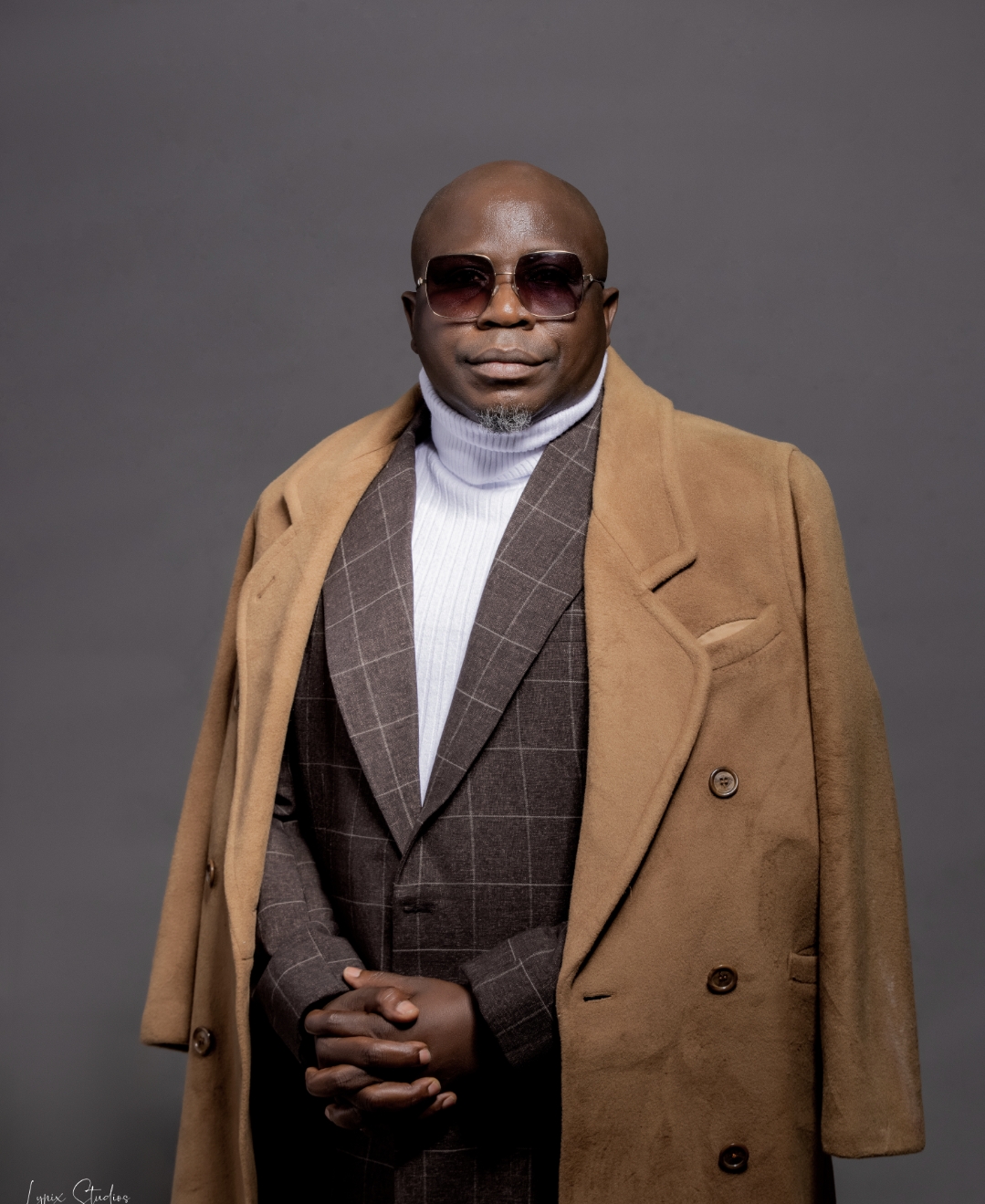
Laffmattazz with Gbenga Adeyinka & Friends Returns In 2026, As Canada Joins Tour
Nigeria’s longest-running and most consistent comedy tour, LaffMattazz with Gbenga Adeyinka & Friends, has officially announced its 2026 tour themed “Next Chapter.” The upcoming edition marks a major milestone as the brand celebrates its 15th edition with a bold expansion that includes Canada for the first time.
The Next Chapter edition represents a clear evolution from previous years — signaling growth, global reach, and a renewed creative vision. While past editions focused on taking premium comedy experiences across Nigerian cities, the 2026 tour elevates the brand with international exposure, upgraded production, and stronger engagement with audiences at home and in the diaspora.
Speaking on the significance of the new theme, organizers describe the 15th edition as more than a celebration of longevity, but a statement of intent — positioning LaffMattazz as a global Nigerian entertainment export.
CONFIRMED TOUR CITIES & VENUES
•Ibadan – Jogor Center (Easter Sunday, April 5th, 2026)
•Akure – The Dome International Culture & Event Center
•Abeokuta – OOPL Marquee
•Lagos – Balmoral Convention Center
•Canada – Multi-city tour (dates to be announced)
Audiences can expect a rich blend of comedy, music, and surprise guest appearances — delivered with the signature “& Friends” experience that has defined the tour for over a decade.
With the Next Chapter, LaffMattazz reinforces its legacy while opening new doors for African comedy on the global stage.
celebrity radar - gossips
Kevin David Kaydee Releases Inspiring Single “Oluwa Settle Me”

Kevin David Kaydee Releases Inspiring Single “Oluwa Settle Me”
Rising music artist Kevin David Kaydee has released a powerful new single titled Oluwa Settle Me, a soulful Afro-inspired anthem that blends heartfelt prayer with modern rhythm.
“Oluwa Settle Me” captures the everyday cry of many believers seeking breakthrough, peace, and divine favour. With emotionally rich melodies and uplifting instrumentation, the song expresses a sincere plea to God for complete answers to life’s pressing questions—career, destiny, relationships, and spiritual fulfilment.

Drawing from Afrocentric sounds and contemporary gospel influences, the track stands out for its simplicity, sincerity, and spiritual depth. Kevin David Kaydee delivers the message with passion, creating a worshipful atmosphere that resonates across age groups and cultures.
The song’s message of hope and dependence on God positions it as more than just music,it is a prayer set to melody. By fusing spirituality with modern lifestyle rhythms, “Oluwa Settle Me” reflects the growing wave of gospel music that speaks directly to real-life struggles while pointing listeners back to faith.
As gospel music continues to evolve across Africa and beyond, Kevin David Kaydee’s latest release reinforces music as a powerful tool for encouragement, reflection, and spiritual connection.
“Oluwa Settle Me” is now gaining attention among gospel music lovers for its relatable message and soulful sound, marking another significant step in the artist’s growing musical journey.
-

 celebrity radar - gossips6 months ago
celebrity radar - gossips6 months agoWhy Babangida’s Hilltop Home Became Nigeria’s Political “Mecca”
-

 society5 months ago
society5 months agoReligion: Africa’s Oldest Weapon of Enslavement and the Forgotten Truth
-

 society6 months ago
society6 months agoPower is a Loan, Not a Possession: The Sacred Duty of Planting People
-

 news7 months ago
news7 months agoTHE APPOINTMENT OF WASIU AYINDE BY THE FEDERAL GOVERNMENT AS AN AMBASSADOR SOUNDS EMBARRASSING

